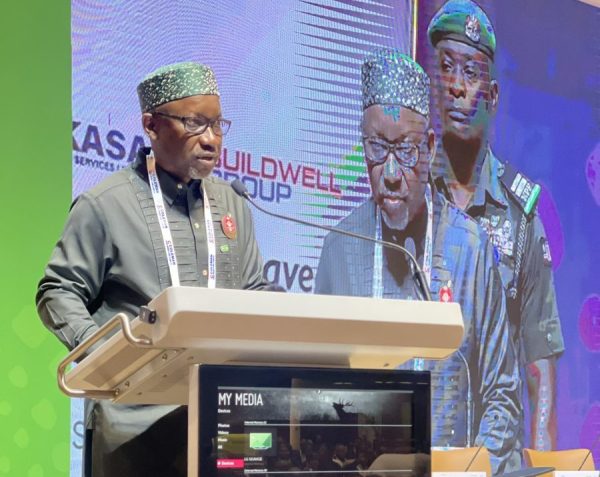
Mkpoikana Udoma
Yenegoa — The Minister of State for Petroleum Resources (Gas), Rt. Hon. Ekperikpe Ekpo, has called on the Nigerian Content Development and Monitoring Board, NCDMB, to prioritize the full operationalization of the Nigerian Oil and Gas Parks Scheme, NOGaPS, by the third quarter of 2025.
Speaking at the Practical Nigerian Content Conference 2024, Ekpo emphasized the vital role of NOGaPS in advancing local content development and creating new economic opportunities for Nigerian businesses in the gas sector.
The Minister stressed that NOGaPS must evolve into fully functional hubs that attract both local and international investments in manufacturing and industrial activities related to the oil and gas industry.
He urged the NCDMB to focus on collaborations with businesses producing essential gas equipment such as compressors, valves, and fittings, ensuring that these parks become critical drivers of innovation and job creation in Nigeria’s energy sector.
“We must ensure that NOGaPS reaches its full potential and becomes a catalyst for the growth of the local gas industry. The NCDMB should make the completion and operationalization of these parks a top priority.
“If we are serious about creating jobs and empowering Nigerian businesses, we need to fully activate these parks and ensure they serve as engines for industrial growth.”
The Minister also highlighted ongoing efforts by the government to boost Nigeria’s gas sector, particularly through the Decade of Gas initiative, which has led to the commissioning of key projects such as SEPLAT Assa North and SPDC Ohaji South gas plants.
These plants, along with major gas infrastructure like the OB3 and AKK pipelines, according to Ekpo, are set to significantly expand domestic gas production and distribution, offering local businesses lucrative opportunities in construction, maintenance, and service delivery.
“The Decade of Gas initiative is not just about increasing our gas production, it’s about creating a sustainable ecosystem that benefits local businesses across the value chain.
“These projects are designed with Nigerian content in mind, and we will continue to ensure that local companies take the lead in construction, operation, and security.”
Ekpo also commended the NCDMB for its work on the NLNG Train 7 project, which has set new benchmarks for local participation and capacity building, an also urged the Board to take these lessons and apply them across other projects to maximize local content participation in future developments.
“NLNG Train 7 has demonstrated what is possible when we prioritize local content,” he said. “The NCDMB has shown us that with the right policies and collaboration, we can achieve excellence in our oil and gas projects while ensuring that Nigerian businesses and workers are at the forefront.”
The Minister went on to highlight the Brass Fertilizer and Petrochemical Project as another key milestone for the gas sector. Recently, Nigeria signed a Gas Sales and Purchase Agreement, GSPA, for the project, which is expected to supply urea, methanol, and other vital products for both the domestic and export markets.
“This project is a game-changer. It’s not just about supplying gas; it’s about transforming the agricultural and industrial sectors, creating jobs, and generating foreign exchange. We are committed to ensuring that this project reaches its Final Investment Decision, FID, as soon as possible so we can start reaping its benefits.”
While the progress made so far was praised, Ekpo reiterated the need for urgency and efficiency in driving these initiatives forward, particularly in ensuring that local content remains a priority. He called on the NCDMB to set even higher standards for project execution and to foster greater collaboration between government, local businesses, and international partners.
“As we move forward, we must not lose sight of the fact that local content is key to a sustainable energy future. The gas sector is poised for significant growth, but this growth must be inclusive, with Nigerian businesses fully integrated into every step of the value chain.
“We have an opportunity to build an energy sector that not only powers our nation but also empowers our people. Together, we can strengthen our economy, create jobs, and ensure that Nigeria remains a key player in the global energy landscape.”



